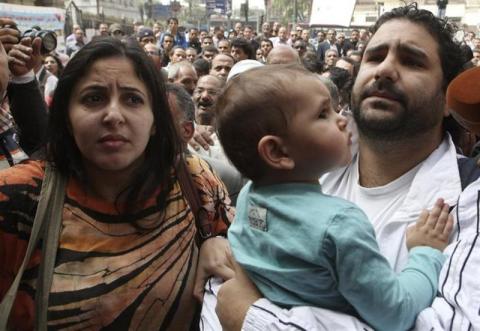Advertisement
Egyptian Police Arrest Leading Activist For Urging Protests
CAIRO (Reuters) - Egyptian police arrested a leading activist on Thursday for calling for protests in breach of a new law that heavily restricts demonstrations.
Alaa Abdel Fattah, a symbol of the 2011 uprising against President Hosni Mubarak, was arrested at his home, security officials said. He had earlier issued a statement saying he planned to turn himself into the prosecutor on Saturday.
The protest law passed on Sunday has heightened fears about the future of political freedoms in Egypt after the military deposed Islamist President Mohamed Mursi in July.
It gives the Interior Ministry the right to ban any meeting of more than 10 people in a public place. Rights groups say it is deeply repressive.
Since Mursi's ouster, the security forces have mounted a fierce crackdown against members of his Muslim Brotherhood, killing hundreds in the street and arrested thousands more.
Abdel Fattah's wife wrote on her Twitter feed that the police had beaten her while arresting her husband. "They stole both our laptops and both our mobiles," she wrote.
Asked about the accusation, an Interior Ministry official said it would be investigated if she filed a formal report.
The United States has expressed concern over the protest law, saying it agrees with groups that say it does not meet international standards.
Abdel Fattah was ordered arrested over accusations he called protests against provisions in a new constitution that allow civilians to be tried in military courts.
"It is an accusation I do not deny," he said in the statement, describing the accusation as "an honour".
Heba Morayef, Egypt director with Human Rights Watch, said: "The protest law gives the police such broad discretion that it will allow for this kind of targeting of political activists."
"This is a completely unnecessary move on the part of the Interior Ministry which makes the whole thing seem all the more punitive," she added.
The protest law makes it illegal to hold a protest without police permission. The government has shrugged off criticism, saying it will not retreat from implementing it.
The prosecutor has also ordered the arrest of Ahmed Maher, founder of the April 6 movement, which also played a leading role in igniting the uprising that toppled Mubarak.
The state news agency said the security forces had "succeeded" in arresting Abdel Fattah, adding that "the necessary security efforts were under way" to arrest Maher.



















Add new comment